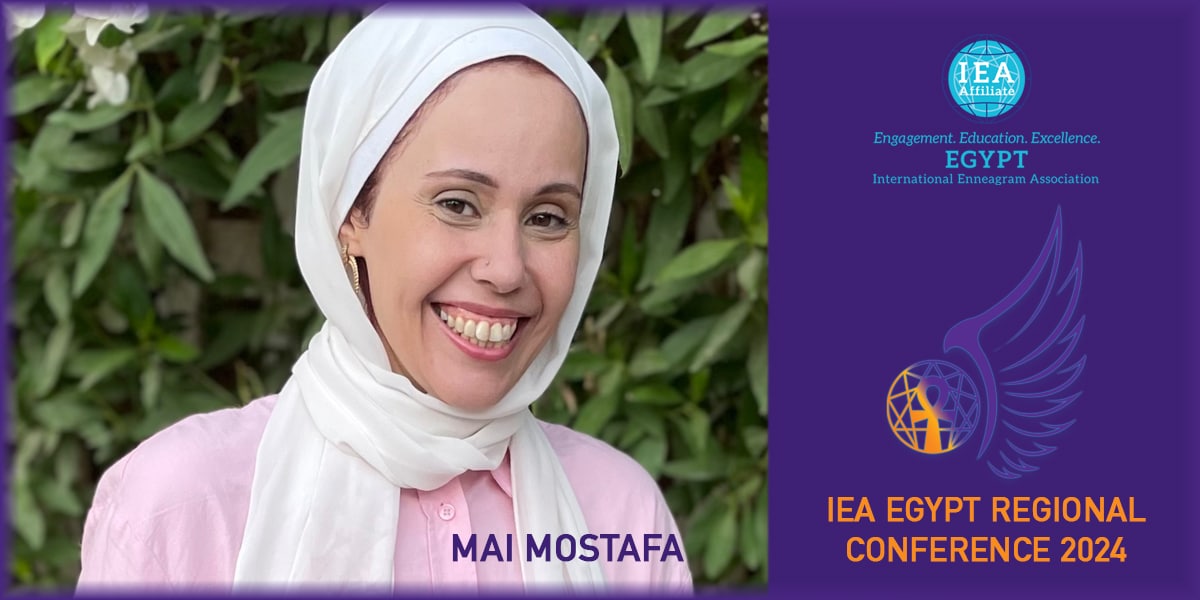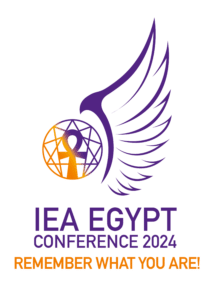Some details in the Enneagram makes it very powerful. It’s about the lens. I can now borrow the lens of my daughter and see how she’s seeing things. And why she’s acting in that way. So it’s about the why, not the how she’s acting. And that for me was a transformation. I literally can say that before studying the Enneagram, my relationship to my daughter was in a certain way. And right now it’s 100% different. And I’m enjoying my motherhood differently.
Mai Mostafa in Enneagram Insights podcast
Flemming Christensen is interviewing Mai Mostafa.
She is an accredited IEA member and lives in Egypt and has studied Cognitive Behavioral Therapy.
And relates to Enneagram type 9.
Mai Mostafa teaches individuals after a plan, is writing an Enneagram book.
She is presenting at the Enneagram conference in Cairo in January on the conscious family and her classifying model.
(Read interviews and articles related to the IEA Egypt Conference in January 2024)
Episode themes
This is a conversation on Enneagram Insights podcast is about:
✔️ How the Enneagram became a part of Mai Mostafa´s life and the impact on her life and relationships.
✔️ The lens of the Enneagram and being able to switch the lens. And better understand why people are acting the way they and.
✔️ The wish for people to heal their relationships. Mai Mostafa: “I want to teach my truth and I wish to preach and practice my gift and hold the space for people to heal.”
✔️ Why we should avoid to misuse the Enneagram and stereotyping in relationships.
✔️ The wish for the Enneagram to spread and that we will remember what it means to be human and connected and to be able to heal each other.
Mai Mostafa quotes from the conversation
The look into the Mirror Programme
Flemming Christensen: ” You have this program called A Deep Look Into The Mirror. What is that about?”
Mai Mostafa: “Well, that program is dear to my heart because it’s based on my own self-discovery journey.
In 2015, I remember that it was like the hardest time of my life when I suddenly felt that I have everything that could possibly make anyone happy.
Yet, I feel miserable. And it was surprising to me because if you looked at my life, I was happily married. I had kids and financially stable and everything is working in my favor.
Yet, when I sit by myself, when I face my own self, I feel like I’m not happy. And that’s where it started to ask big questions. What’s going on?
What am I missing? What’s my relationship to myself? And one thing led to the other until… I found the Enneagram. That was one of the big revelations.
And that’s why, after a while, with working with all what I went through and with the Enneagram, with the coaching, with the cognitive behavioral therapy that I’ve been studying, I decided to share part of what I went through, but to help other.
Instead of trying to find the answers sporadically, I decided to share everything that I learned.
I combined everything. I learned, not everything, but some of the big things that made a difference to me in that program.
And I designed it in a way to be a little bit different than the usual courses. It’s more of a one-to-one session, but with a plan. So every session has an agenda, but it’s open agenda, but it’s a certain topic that we discuss together, me and the client.”
The Enneagram and the lens
At the Enneagram conference in Cairo in 2024 Mai Mostafa will be presenting a topic about a classifying model for a conscious family.
Mai Mostafa: “And that classifying model is something I came up with mainly based on my personal experience with my husband and my kids, and also applying it and working with other clients, like sharing the insights and seeing the difference that, or the impact that it could make.
You know, when we feel that we are struggling to understand our kids, and we are struggling to get to know what’s going on wrong, I’m trying everything I know, and I’m trying my best, and I’m trying to be a good mother or a good father.
I’m trying to be compassionate, and everything I’m trying is getting me a little bit closer, but there’s always something missing or something that is not working the way I want it to be.
And that was my story with my daughter, my elder daughter. She’s 13 now, and she’s a type 6. Before studying the Enneagram, I used to feel puzzled.
I didn’t get what’s wrong, why our communication was not working.
Although I’m trying everything, and I had the kids of the family, my nieces and nephews, I had very good relationship with. And when it came to my daughter, I was puzzled. I didn’t know what to do.
So after studying the Enneagram, it was an aha moment. It was a revelation.
Now I get that we speak two different languages. And that’s what gave me the idea to look at the different matching.
If your style is similar to your kid, if it’s different, how would that affect the dynamic? And same goes to your partner.
So it’s these details in the Enneagram is what makes it very powerful.
It’s not about being an introvert or an extrovert or behaving in a certain way. It’s about the lens.
Like when you have the tool, which is the lens, now you’re looking differently, and you can switch the lens.
I can now borrow the lens of my daughter and see how she’s seeing things.
And why she’s acting in that way. So it’s about the why, not the how she’s acting.
And that for me was a transformation. I literally can say that before studying the Enneagram, my relationship to my daughter was in a certain way.
And right now it’s 100% different. And I’m enjoying my motherhood differently.
It’s understanding why we’re doing what we’re doing.
Why we are motivated to do things in a particular way. And if we can understand how, in this case, our child is motivated to solve problems, communicate, relate to others, and we can tune in, it gives us a language, to understand the dynamics”
Another Enneagram Insights interview in the IEA Cairo series
IEA Egypt Conference 2024: Remember What you are.



